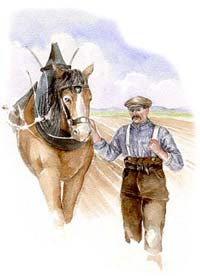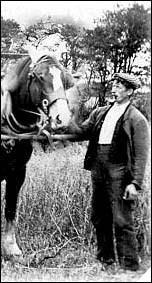The Land
Bothy Culture
 Through the "improvement" years of the early and mid 1700s farming
developed into a labour intensive industry providing work for thousands
of North East folk. Landowners leased their land in lots to farmers for
agreed terms who in turn employed labourers for the seasonal work.
Through the "improvement" years of the early and mid 1700s farming
developed into a labour intensive industry providing work for thousands
of North East folk. Landowners leased their land in lots to farmers for
agreed terms who in turn employed labourers for the seasonal work.
At the bigger farms, the "fairm-toons", the farmers employed a grieve as a general manager. Next in line was the ploughman, the most respected and best paid of the workers. Then came the orra-man or cattleman and after him the general labourers and the orra-loon, a young jack of all trades. The unmarried men, the "bothy loons", lived in the farm bothy, a small, very basic building usually built on to the side of the cattle byre.
The workers were signed for six month working terms at the fee'ing fairs which took place in the market towns at Whitsun and Martinmas in late November.
![]() Christine Kydd sings the Rovin' Plooboy-o
Christine Kydd sings the Rovin' Plooboy-o
Women too were appointed for set terms, usually to work in the kitchens, cooking for the farmer's family and the "bothy loons." These "kitchie deems" (kitchen dames or girls) were kept hard at work under the watchful eye of the farmer's wife.
"The Chaumer"
The unmarried farm workers lived in the bothy (or more accurately, in this area, the chaumer). Normally they took the job on a six monthly basis seeking new employment at the Spring or Autumn “Feeing Market” — unless they were asked to bide.
It was in bothies like this that the bothy ballad originated, expressing the feelings on their living conditions, the tyranny of the “Heid Man” or the virtue of the local lassies. Living conditions were rough, each man’s clothes being hung on his section of the wall, his valued possessions were locked in a kist while he slept in a wooden box bed with a “chaff” mattress for comfort.
The term “bothy” originates from the Angus area where it was common for the workers to cook their own meals. In the Buchan area it was more common for the men to be fed in the farm kitchen and they only slept in the “chaumer”.
"The Horseman's Word"
 To become a “Horesman”, a form
of initiation had to be endured. The young “Orraman” went to
the barn on the appointed night armed with a loaf, a candle and a bottle
of whisky. He was blind-folded and taken to an altar made of a bushel,
where a series of questions had to be answered. During the ceremony he
swore never to reveal the “Horseman’s
Word”.
To become a “Horesman”, a form
of initiation had to be endured. The young “Orraman” went to
the barn on the appointed night armed with a loaf, a candle and a bottle
of whisky. He was blind-folded and taken to an altar made of a bushel,
where a series of questions had to be answered. During the ceremony he
swore never to reveal the “Horseman’s
Word”.
The Horseman's Word
The following notes regarding "The Horseman's Word" arrived at the Archive in August 2005 from Stewart Beveridge who emigrated to Australia in 1970:
I read an article on this many years ago in one of the Weekly or Monthly UK magazines. It seems that The League of the Horseman's Word was similar in many respects to modern Trade Unions, the difference being that the bosses were the farmers, landowners etc. all part of the establishment per se, so in the God fearing climate of the North East as it used to be, they all went to kirk on Sunday. To emphasise their differences, the horsemen worshipped their Founding Father, Tubal Cain the first blacksmith or worker in brass and other metals who is important to the equestrian world and became translated to Auld Clootie or Auld Nick (Satan) who was reputed to be an exceptional fiddler. (See Burns' Tam o' Shanter). Apparently there was an initiation ceremony where a novice was given the welcoming handshake before being given "The Horseman's Word". He was sworn to secrecy about The Word and told never to disclose it or write it down. At the end of the ceremony he was offered a pen and paper and told "Now that you ken the word, write it." At this point, if the person reached for the pen, one of the officials standing by would hit his hand VERY hard with a chain causing wounding.
The researcher of the article said he had interviewed many old horsemen with massive scars on the backs of their hands. The other classic question was "Fit do you need maist?" Many answers were forthcoming but the ideal was "Mair light." The song "Nicky-Tams" recounts part of this event when the singer is inducted after being Fee'd to the Mains (hired to the farm). "Weel I gaed on for Baillie Loon, Sine I gaed on for Third (Horseman), And sine of course I had to get the Horseman's Grip and Word". I knew the song but had not appreciated what was being said until reading the article. I did my Agri Practical on a farm near Montrose in 1953 which was not all that far removed from the time in question. Horse work was being phased out by that time but the older farm hands were a pretty insulated group of people. In those days it was a 5½ day week with very few people having cars so public transport, if available, took you where you wanted to get to. The men and wives would come into town on Saturday afternoon. The men, in their good blue suits with white collars and ties, went to the football while their wives went shopping. Everyone went home on the 5pm bus. Life was simpler in many respects in those days. Stewart Beveridge, August 2005.
If you know which magazine published the article Stewart refers to, please let us know. GS

